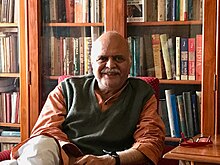
Saleem Kidwai (7 August 1951 – 30 August 2021) was a medieval historian, gay rights activist, and translator. Kidwai was a professor of history at Ramjas College, University of Delhi until 1993 and thereafter an independent scholar.
Early life and education
Saleem Kidwai was born 7 August 1951, in Lucknow, Uttar Pradesh, India. His family and relatives owned extensive amounts of land in the area. He knew he was gay when he was in his late teens. When he was 17 years old, he moved to the city of Delhi, in part because he knew that living in a small town would significantly constrain his ability to live openly as a gay man.
He enrolled in and received his bachelor's and master's degrees in history from Delhi University, and he began teaching there in 1973.
In 1976, he enrolled in a doctoral program at McGill University in Montréal, Québec, Canada. In October 1977, Montréal police raided two gay bars, Truxx and Le Mystique, in a military-style raid. They arrested 146 men in what was the largest mass arrest since the domestic terrorist kidnappings of the October Crisis in 1970. Kidwai was among those arrested, forced to submit to venereal disease tests, and charged with criminal activity. Deeply traumatized by the incident, he quit his doctoral program and returned to teaching at Delhi University. (Although the province of Quebec amended its Human Rights Charter to include homosexuality as a protected class, the criminal charges against Kidwai were not dropped until 1982.)
Academic career
He was one of the first academics to speak publicly as a member of the LGBT community and published with Ruth Vanita as co-editor of Same-Sex Love in India: Readings from Literature and History, a pioneering work documenting and exploring the indigenous roots of same-sex desire in South Asia.
His other academic areas of interest included cultural history, the history of sexuality and the history of the courtesan singers (tawaifs).
Kidwai translated singer Malika Pukhraj's autobiography, "Song Sung True." His other translations include The Mirror of Wonders, a collection of short stories of Syed Rafiq Hussain, the first Urdu writer to write in the ‘animal stories’ genre. He was the only translator to have translated the novels of the well-known Urdu writer Quratulain Hyder who transcreated her own novels. Kidwai has translated two remaining novels of hers – 'Chandni Begum' and 'Safina-e-Gham-e-Dil' as "Ship of Sorrows". He was working on her last remaining untranslated novel 'Gardish-e-Rang-e-Chaman' as well as a well-known Urdu history of Lucknow by Mirza Jafar Hussain before his death.
Death
Saleem Kidwai suffered cardiac arrest on 30 August 2021, and died in a hospital in Lucknow.
Publications
- Ruth, Vanita; Kidwai, Saleem, eds. (2000). Same-Sex love in India: Readings from Literature and History. London: Palgrave Macmillan. ISBN 0-312-22169-X.
- Kidwai, Saleem (2003). Song Sung True. New Delhi: Kali for Women.
- Kidwai, Saleem (2012). The Mirror of Wonders. New Delhi: Yoda Press.
- Kidwai, Saleem (2017). Chandni Begum. New Delhi: Women Unlimited.
- Kidwai, Saleem (2019). Ship of Sorrows. New Delhi: Women Unlimited.
References
- Rao, R. Raj (31 August 2021). "Saleem Kidwai (1951-2021): A pioneering historian of same-sex love in India". Scroll.in. Retrieved 1 September 2021.
- "Saleem Kidwai (1951-2021): 'Generous, encouraged people to be comfortable with their sexuality'". The Indian Express. 31 August 2021. Retrieved 1 September 2021.
- Quadri, Shireen. "Those Who Left and Those Who Stayed: Saleem Kidwai on the Pangs of Partition in Qurratulain Hyder's works". the punch magazine. Retrieved 16 March 2021.
- ""We continue to make Urdu as a Muslim Language." | Muslims Today". 4 September 2013. Retrieved 17 March 2021.
- Ayyar, Raj. "Saleem Kidwai Uncovers the Many Faces of Gay India". GayToday. Retrieved 6 April 2007.
- "Manoj Bajpayee, Apurva Asrani remember author Saleem Kidwai: 'His work for India's LGBTQ is unparalleled'". The Indian Express. 30 August 2021. Retrieved 1 September 2021.
- "Gay historians: Ruth Vanita and Saleem Kidwai". 4 March 2005. Retrieved 6 June 2015.
- "Historian, queer rights activist Saleem Kidwai dies in Lucknow". Hindustan Times. 30 August 2021. Retrieved 30 August 2021.
- Ruby Lal (18 February 2013). Coming of Age in Nineteenth-Century India: The Girl-Child and the Art of Playfulness. Cambridge University Press. pp. 2–. ISBN 978-1-139-85201-2.
- ^ Goldenberg, Suzanne (2 September 2021). "Saleem Kidwai, scholar who unearthed long-buried literature on gay love in India, dies at 70". The Washington Post. Retrieved 3 September 2021.
- ^ Cadotte, Olivier (5 March 2019). "Anti-LGBTQ+ Raids and Police Brutality". The Link. Retrieved 3 September 2021.
- "Writings on same-sex love integral part of Indian lit: Book - Indian Express". archive.indianexpress.com. Retrieved 14 March 2021.
- "Dastaan-e-Dilrubai: Fact, fable and the unknowability of the real Siddheshwari Devi". Firstpost. 4 October 2020. Retrieved 14 March 2021.
- Anasuya, Shreya Ila (5 October 2019). "Memories of Akhtari". mint. Retrieved 14 March 2021.
- "Review: Ship of Sorrows by Qurratulain Hyder and translated by Saleem Kidwai". Hindustan Times. 29 May 2020. Retrieved 14 March 2021.
- "Of an upper-class milieu and how it navigates a fraught future in the build-up to Partition". The Indian Express. 9 December 2019. Retrieved 14 March 2021.
- Bilal, Maaz Bin (16 February 2020). "Ship of Sorrows: Of Hyder-ite whims and griefs". National Herald. Retrieved 14 March 2021.